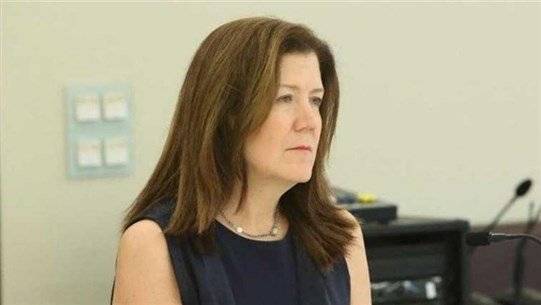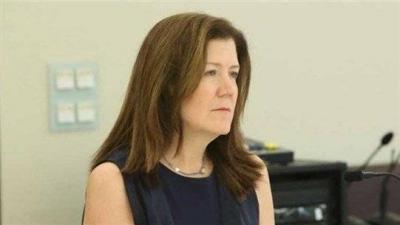The Mi Chaidiac Foundation - Media Institute held a launch event for a policy brief report and recommendations related to the project "Renewing Political and Economic Structures in Lebanon," organized in partnership with the Public Affairs Section of the U.S. Embassy in Beirut. The event was attended by U.S. Ambassador Dorothy Shea, the Foundation’s president Dr. Mi Chaidiac, political, diplomatic, media figures, and interested parties.
The project manager, Professor Mirai El-Haj, began by expressing her team's gratitude for the opportunity to work on a project that led to the issuance of this policy brief report, which includes substantial reforms and targeted support led by the United States. She also thanked newly appointed Public Affairs Officer Chrissy Hayden and Melissa O'Shaughnessy for taking on grant responsibilities for the project. Furthermore, she expressed her appreciation to Ambassador Shea for her participation in the project and her ongoing support.
El-Haj discussed the acute economic, financial, political, and health crises facing Lebanon that threaten its population, plunging them into poverty and jeopardizing their well-being. She noted both internal and external factors contributing to these crises, stating, "In such an environment, executing and operating the program smoothly was a significant responsibility. There was a need to analyze issues without unnecessary delays, plan, organize, and complete eleven dialogue sessions and two bilateral discussions on time, within budget, and scope. The goal was to identify pressing challenges, analyze risks, and provide policy responses that could mitigate obstacles and combat the problems in the country."
She continued, "The strong conclusion is that even if they did not operate perfectly, this policy paper and recommendations can improve the situation. The Mi Chaidiac Foundation must continue its work with the Public Affairs Section of the U.S. Embassy in Beirut, now, in the second part of the program and next year. Deepening and enhancing our cooperation will lead to more policies that will serve as a pathway to recovery and an effective action plan to avoid the country’s free fall."
El-Haj expressed confidence that the U.S. Embassy would continue to be a strong and reliable partner for the Foundation, stating, "Our partnership is an absolute necessity." In conclusion, she conveyed her deep appreciation to Ambassador Shea for her continued support and to all members of the Public Affairs Section at the U.S. Embassy.
Dr. Mi Chaidiac then spoke, expressing her sincere gratitude to all attendees and her happiness with the work the Foundation's team accomplished in collaboration with the U.S. Public Affairs Section from October 1, 2021, to the present. She noted, "In this first phase of the project, we hosted eleven dialogue sessions and two bilateral discussions with prominent local and international speakers with vast expertise. They addressed several interrelated issues regarding the situation in Lebanon, its constraints, and the potential path to recovery. All speakers agreed that the crisis in Lebanon began as a debt crisis, with a nationally organized fraudulent scheme, where new money was borrowed to pay existing creditors until the new funds ran out. It then transformed into a banking crisis, an economic crisis, and ended with a social and humanitarian crisis, especially following the additional tragedy that occurred two years ago, one of the worst non-nuclear explosions in history, the catastrophic Beirut port blast, which destroyed many neighborhoods in downtown and led to the death and injury of hundreds."
Dr. Chaidiac added, "If it's likely that the financial and economic crisis ranks among the three most severe crises, the social impact of the crisis will be catastrophic, as over half of the population currently lives below the national poverty line. This multi-level crisis has led to the collapse of most basic public services, particularly electricity, sanitation, and education," highlighting that "the collapse or depression has affected all institutions, currently putting unprecedented pressure on the only remaining institution, endangering the Lebanese Armed Forces."
She continued, "The dialogue sessions throughout the project revealed how Lebanon is far from being a central topic in the Vienna talks, but they uncovered that the Iranian nuclear deal could change the game in Lebanon, as it may define Iran's future role in the region and that of its agent in Lebanon. There is no doubt that Hezbollah already wields significant influence in the country, overshadowing the Lebanese state and its institutions, playing the role of a state within a state, and monopolizing strategic decision-making. The only way to change that is to restore Lebanon's identity with support from the international community."
Dr. Chaidiac explained that "adopting and implementing these policies is incredibly challenging due to the internal and external complexities of the country, yet it represents a challenge worth pursuing." She emphasized that the rule of law must prevail, noting, "Lebanon will not be able to operate correctly if it lacks one of the four universal principles that can build a state: accountability, just law, open government, and fair and transparent law. If these pillars are implemented, they will ensure judicial reform. Everything else will follow."
She argued, "To reimagine the future, there is an urgent need to focus on reducing the significant political and economic disturbances that exacerbate social polarization, undermine national security, and erode trust in government leaders. However, despite the decline in trust in government, it is the government itself that must take political responsibility for solving the fundamental problems, achieving security, and ensuring democratic governance for citizen safety."
Dr. Chaidiac stated, "The challenges facing the country in security, economy, and politics can be overcome if this policy paper and recommendations are adopted and implemented by the parliament members who attended today and other parliamentary members who believe in state sovereignty. Following the Lebanese parliamentary elections two months ago, which transferred most seats to opposition parties, there is a need to work on a common agenda and a national strategy to restore confidence and a shared sense of direction to pave the way for a more sustainable future for the country."
She stressed the need for commitment, diligence, and follow-through and emphasized the need to enhance a revolution in our way of thinking and acting to win the battle. "We need to operate more democratically, learn from our mistakes and bad experiences. Most importantly, we must learn to think as Lebanese from the perspective of both internal and external security. In this regard, securing our borders and resources while achieving prosperity should be our top priorities."
In closing, she thanked the U.S. Public Affairs Section for making this project possible and providing the Mi Chaidiac Foundation - Media Institute and the Lebanese community the opportunity to promote healthy building principles and practices that could lead to the renewal of political and economic structures in Lebanon. She also thanked Ambassador Shea for her "continuing brilliant diplomatic presence with the Lebanese people," stating, "You are a dear friend who has never failed to stand by Lebanon, invest in its people, build its human capital, and prioritize empowering youth and women. Long live the exceptional relationship between our two countries, and may we always walk together on the path to prosperity."
For her part, Shea stated, "Mi Chaidiac, I would like to thank you and the MCF team for bringing us together here today and for your team's hard work on this program. During the first phase of your program, the United States contributed to these discussions, and I joined the dialogue session focused on women, which concentrated on conflict resolution and political processes, along with many senior U.S. officials. Unfortunately, since the first phase of this program, the situation for most Lebanese has deteriorated, with more Lebanese not having enough food on their tables, which is a result of this deep economic crisis."
She added, "The United States and our international partners are committed to doing everything we can to help. In March of this year, the U.S. government, through the U.S. Agency for International Development, announced it would provide $64 million in additional humanitarian aid to help feed vulnerable groups in Lebanon. This is in addition to hundreds of millions of dollars we have invested in other developmental assistance since the onset of the multiple crises in Lebanon."
She urged for the swift passage of all required legislation and the implementation of reforms, emphasizing that "when it comes to economic and financial reform, we must keep in mind that the days are long but the years are short, and every day we delay implementing reforms is lost, which is something Lebanon cannot afford."
She announced, "The Lebanese people deserve better than the mismanagement and corruption and lack of accountability we have seen for decades. We urge the elected officials and political leaders of this country to seriously and urgently heed the Lebanese people's ongoing call for change and take the necessary steps to put the economy back on track."
She considered "another fundamental challenge is the need for judicial independence; judges must be able to perform their duties without interference, coercion, or pressure. They need to rule based on what is right under the law without fearing political or personal repercussions. Judicial independence complements economic growth and prosperity, signaling to investors, here and abroad, that they can trust Lebanon."
She concluded, "I truly hope that our contribution and the support of the U.S. government for Lebanon, along with some recommendations put forth through the dialogues of this project, have encouraged those newly elected or re-elected and the political leaders of this country to listen to the calls of the Lebanese people and the international community to work seriously and urgently to implement economic and social recovery swiftly and resolutely."
She thanked Dr. Mi Chaidiac and her team once again for bringing everyone together today and for always helping the community address these complex issues. During the event, three video reports were shown regarding the first part of the project "Renewing Political and Economic Structures in Lebanon," organized in partnership with the Public Affairs Section of the U.S. Embassy in Beirut.
The first report included an introduction to the project and the number of people who followed the various dialogue seminars included in its first phase, which comprised eleven dialogue sessions and two individual interviews featuring a group of 46 speakers from various fields of expertise. Notably, the number of attendees for some sessions and discussions exceeded:
25,000 for the first dialogue session, 32,000 for the second, 26,000 for the third, 35,000 for the fourth, 28,000 for the fifth, 27,000 for the sixth, 15,000 for the seventh, 57,000 for the eighth, 15,000 for the ninth, 6,000 for the tenth, and 11,000 for the eleventh. The number of attendees for the bilateral discussions reached 18,000 for the first and 32,000 for the second.
The total number of followers of our activities reached 170,000 via the Foundation's YouTube channel, while the level of interaction on the Facebook page reached 3,400,000. The second report included excerpts from what speakers said in various dialogue sessions, while the third report summarized the main recommendations proposed by participants in this program, which outline a pathway for solutions in hopes of correcting the political and economic approach in Lebanon.
In conclusion, a summary of the policy report being discussed and the recommendations proposed by the speakers, prepared by the Mi Chaidiac Foundation - Media Institute team, was distributed.




